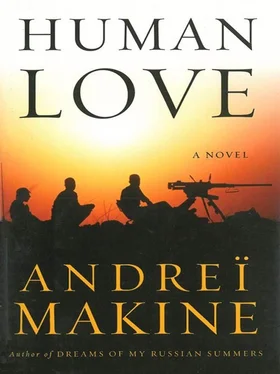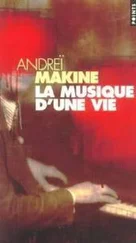He slept little, listened to the plaintive breathing of the woman squeezed tight against his arm, studied the photos that seemed to meet his gaze in the phosphorescent glow of the nightlight. Hemingway as a boxer in a ring, the charmers smile directed at the photographer. Castro at the center of a crowd, in which, if you looked carefully, according to Louise, you could make her out. Malraux, elegant and ambiguous, like a croupier in a casino. And finally Che, with eyes ablaze and wild hair. And lower down a caricature: de Gaulle transformed into Hitler, with the S S insignia on his shoulder… They must all have had a blind dog in their lives, thought Elias.
During the days that followed Louise avoided him, and when they ran into one another more or less by chance, he perceived that she had fully regained her self-possession. “Wow! That was a hell of a binge!” she exclaimed, very much at her ease. “I must have spouted a lot of crap at you…”
She left Cuba a month later, without letting him know in advance. A note reached him the day after her departure. “I was frankly disappointed with the way the revolution was going,” she wrote. “And I never hid that from you.” She also mentioned that the Paris newspaper she had been working for was offering her a job.
Two years later, by then in Moscow, Elias would learn of the publication of Louise Rimens’s book. The title would be a surprise and yet no surprise to him: When Revolutions Die .
During the rest of his time in Havana he often tried to find a logic in this frenzy of human beings committed to what seemed like a monolith: History, the Revolution. A young woman taking her revenge on a faithless lover by falling in love with Che, wishing to set the whole world on fire, and recalling her grandmothers house with poignant nostalgia. A woman ready to sacrifice millions of human lives on the altar of an Idea but who wept when she thought about her blind dog…
The contradictions of existence, he thought with a smile, recalling his studies in philosophy. Or perhaps quite simply a lack of professionalism on the part of these amateur revolutionaries?
Then he thought about the USSR, the country his fathers’ friends used to give as an example of “a society of the future conceived along purely scientific lines,” In Cuba the Russians seemed to be accomplishing a task that was almost routine for them, that of constructing a world others could only dream about. On the facade of one of the factories they were erecting he had one day read: “Our tasks are resolved, our goals are clear! To work, comrades!” In this slogan, simplistic though it was, could be read an unshakable certainty that was lacking in the dilettantes of the liberation struggles.
On the plane to Moscow he was thinking about the title of “professional revolutionary” that his father laid claim to, as did Ernesto – and that Lenin bore. Then he came to grasp the difference between amateurism and professionalism in revolution. The professional never asks himself the question, What’s the point? only by what means? since he has no life apart from the dream whose realization he is irresistibly and patiently engaged in.
Seventeen years later, at the end of the 1980s, we met in Florida at Fort Lauderdale. It occurred to us that those Cubans who were bailing out from their island in distress might well be landing not very far from these shores. Still more obvious than Cuba’s pitching and tossing, however, was the impending shipwreck of that great ocean liner, the USSR. I had never questioned Elias so frankly about the blindness of those who, like him, sacrificed their lives to a cause. Tve often heard intellectuals declaring that thanks to such and such an event the scales had fallen from their eyes,” he replied. “That they had seen nothing blameworthy in a régime until all at once what had seemed magnificent the day before became contemptible. Yes, the USSR, Mao, and now Castro. Almost twenty years ago I knew a woman, a French journalist working in Havana. She wrote a book to explain how she had suddenly realized that the Cuban revolution was nothing but an appalling dictatorship. Well, you know, I never thought our struggle was perfect or that the people engaged in it were saints. But IVe always believed in the need for a different world. And I still believe in it.”
This answer must then have struck him as too solemn and abstract, too bound up with the ideas of his youth. He inclined his head slightly: “You see that fellow over there, yes, the one in shorts. With a spotted shirt. The steak he s eating weighs at least a pound. His country America, defends this man’s right to eat that amount of meat with all its might. And especially his right not to give a good goddamn that on the opposite shore of the Atlantic children with amputated arms are chewing on bark to assuage their hunger before they die. And yet the two shores are one and the same world. You just need to take the long view, to stand up on tiptoe, like this, to see it.”
He did just this, stood up in the middle of the restaurant terrace where we were sitting.
This is one of the clearest images I shall retain of him: a man upright, straight as a blade, towering above the crowd of diners.
WHAT WAS HARDEST, AS ALWAYS, was steeling oneself to kill the children. The offspring of a tyrant, of course, the future élite of an oppressive regime. But once the door to their bedroom was smashed in, Elias turned away in spite of himself to avoid the gaze of the little boy trying to hide behind the curtain, the little girl clutching a big doll in a foam of lace…
The airport had been taken an hour earlier, just after the crushing of the state guard and the occupation of the armory. Commandos held the railroad station, the principal roads, the main banks. The assault was delayed by unexpected resistance around the radio station. But the presidential palace was already reverberating with gunfire. The orders were clear: to liquidate the head of state as well as all the members of his family, without exception. Left alive, one of the sons could have become the rallying point for counterrevolution.
Leading his unit, Elias reached the first floor, passed through the continuous fire of the bodyguard, assisted the engineer to blow in the door to the private apartments. The assault troops machine-gunned every nook and cranny, covering one another on the staircases and at the corners of corridors, threw grenades. And then came that children’s bedroom, the impulse to shoot without killing, keeping one’s eyes shut, or even to be killed before being able to kill… They informed him that the secret police defending the radio station had been dislodged. He had to leap into a jeep, force a way through the bursts of fire, and, once quickly installed in front of a microphone, read out the “Declaration by the Provisional Popular Government” he had drafted the day before: “Comrades! The heroic struggle of the Army of National Liberation has put an end to the bloody and corrupt dictatorship of Marshal X. Power is in the hands of the people, represented by the patriotic forces of the ANL and the Socialist Party of Progress…”
Highly professional work, from the first shots fired in the morning right through to this broadcast, in a studio still smelling of the acrid reek of gunpowder and the sweat of breathless men. Elias read in grave tones, his eyes sometimes straying from the typewritten lines; he knew the text by heart. At one moment, looking up, he noticed a large jar half filled with a cloudy liquid at the other end of the desk. He suppressed a smile: here in the heart of a third world country, right in the middle of a revolution, these marinated tomatoes with their label in Russian…
Each time, in this final phase of seizing power, this jar would make its appearance; someone had left it behind in the building where the Soviet instructors taught the art of overthrowing dictatorships. And each time, moved at having addressed the population of a whole country, Elias would forget to throw away these tomatoes, steeped in their murky marinade.
Читать дальше









